|
|
|
Sort Order |
|
|
|
Items / Page
|
|
|
|
|
|
|
| Srl | Item |
| 1 |
ID:
128574
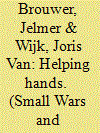

|
|
|
|
|
| Publication |
2013.
|
| Summary/Abstract |
This article analyses to what extent the Burmese KNU insurgency made use of external support from states, refugees, and diasporas. Based on extensive fieldwork it is concluded that support from neighbouring states and refugees has for years kept the Karen rebellion alive. Western countries perceived forms of resistance to the illegitimate Burmese regime as just and have therefore played a crucial role in the continuation of conflict in Karen State. It is important that policymakers and donors as well as executing organizations continue to reflect critically on the way they exercise their work.
|
|
|
|
|
|
|
|
|
|
|
|
|
|
|
|
| 2 |
ID:
092311
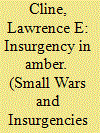

|
|
|
|
|
| Publication |
2009.
|
| Summary/Abstract |
Multiple ethnic insurgencies have existed in Myanmar since independence. The military junta's response has been extremely brutal at the tactical level, but has shown some political astuteness at the strategic level, with a series of ceasefires with most of the ethnic groups. Despite these ceasefires - most of which have resulted in the continued existence of quasi-independent armed groups - other ethnic movements have continued their armed operations. The overall strategic picture is one of stalemate, with the ethnic movements continuing to exist, but with few realistic prospects of expanding their operations.
|
|
|
|
|
|
|
|
|
|
|
|
|
|
|
|
| 3 |
ID:
051457
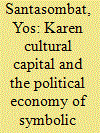

|
|
|
| 4 |
ID:
163108


|
|
|
|
|
| Summary/Abstract |
Using the case of Karen refugees in Japan, this paper examines how a state-driven refugee resettlement policy resulted in refugees suffering under difficult conditions and how, in turn, this drove the existing ethnic community to become an active player in assisting resettled refugees to adapt, in contest with the state. Japan was the first Asian country to initiate a refugee resettlement program in 2010. However, the government failed to consult with other stakeholders, notably the ethnic community, causing difficulties for the refugees in adapting to their new life. In helping resolving this crisis, the Karen community emerged as a legitimate actor in the governance of these refugees. The current study highlights the contest between the state and ethnic communities over resettlement programs and contributes to the understanding of the structural formation that influences refugees in the early stage of resettlement.
|
|
|
|
|
|
|
|
|
|
|
|
|
|
|
|
| 5 |
ID:
117190
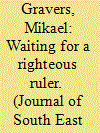

|
|
|
|
|
| Publication |
2012.
|
| Summary/Abstract |
Karen believe they are like orphans without a king and leader; royalty often appear in their myths, legends and prophecies. Buddhist Karen await the next Buddha, Ariya Metteya - preceded by a righteous Karen leader - who shall cleanse the world. This paper explores the Karen imaginary and notions of royalty as preconditions for a new era governed by Buddhist ethics that will bring peace and prosperity. This imaginary combines religion and politics in a millenarian model of the world as seen from the margins of traditional kingdoms and modern nation-states - what James Scott has termed 'non-state spaces'. The Karen oscillate between defensive and offensive strategies, as shown in several examples. Is this imaginary a premodern phenomenon typical of marginalised minorities or perhaps also part of a modern, global imaginary of a better future? The concept of morally enchanted leadership is discussed in relation to states, nations and globalisation.
|
|
|
|
|
|
|
|
|
|
|
|
|
|
|
|
| 6 |
ID:
158204
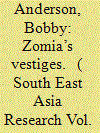

|
|
|
|
|
| Summary/Abstract |
Opium poppy cultivation in Thailand fell from 12,112 hectares in 1961 to 281 hectares in 2015. One outlier exists: Chiang Mai Province’s remote southwestern district, Omkoi. Ninety percent of the district is a national forest reserve where human habitation is illegal. However, an ethnic Karen population has lived there since long before the law that outlawed them was created, unconnected to the state by road, with limited or no access to health, education and other services. Omkoi’s Karen increasingly rely on cash-based markets. Their lack of citizenship precludes them from land tenure that might incentivize them to grow alternative crops, and their statelessness precludes them from services and protections. Nor is the Thai state the singular Leviathan that states are often assumed to be; it is a collection of agencies and networks with divergent interests, of whom one of the most powerful, the Royal Forestry Department, has purposely made Omkoi’s population illegible, and has consistently blocked the attempts of other state actors to complexify Omkoi beyond the simplicity of its forest environment. These factors make the state illegitimate to Omkoi’s Karen just as Omkoi’s Karen are illegitimate to the state, and make the cultivation of short-term, high-yield, high-value, imperishable opium a logical economic choice for poor Karen farmers, especially given the historical lack of law enforcement presence. However, that presence is growing, as Omkoi becomes one of the last areas of Thailand to experience the historical extension of lowland Padi state power into an ungoverned, untallied highland.
|
|
|
|
|
|
|
|
|
|
|
|
|
|
|
|
|
|
|
|
|